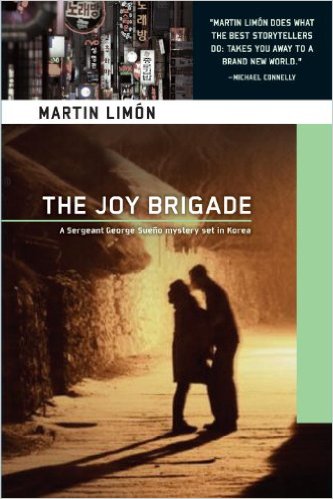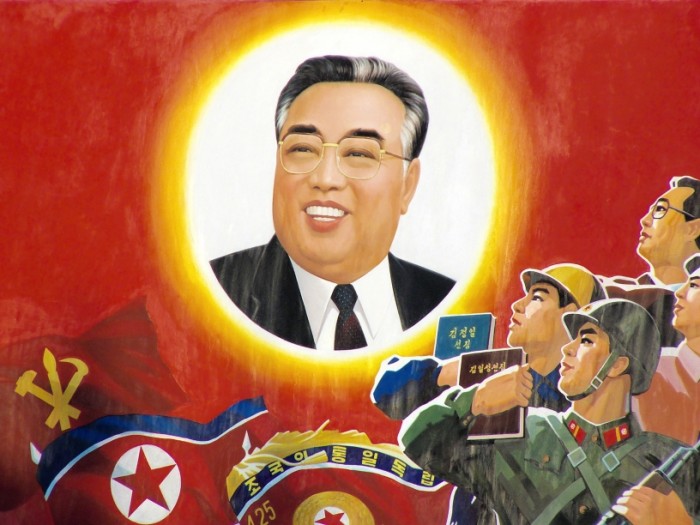This is the eighth title in the adventures of George Sueño and Ernie Bascom, Crime Investigators, Military Police, United States Eighth Army, South Korea in the 1970s when the Cold War was often very hot. Sueño is the thinker of the two, while Bascom resolves most problems with his fists and sometimes with an illegal hand gun.

Having read the previous seven titles over a number of years, I had noticed that North Korea never figures in the books. The villains are inevitably Americans and South Koreans in some combination. Not so in this title. The setting is North Korea.
Sueño has agreed, for reasons of his own but as always involving his first friend, to go into North Korea undercover. Whoa! How can this 6’ 2” American G.I. go undercover in North Korea! Limón contrives some pretty clever ways and means to explain that. They hinge on (1) the isolation of North Korea and North Koreans from the wider world and (2) the tyrannical nature of the regime.
Because North Korea is so isolated, North Koreans, even North Korean police, reason from the propaganda stereotypes the regime has drummed into them for thirty years at the time of the story. Americans are blond-haired and blue eyed with enormous noses. Sueño is a Latino, big, yes, but dark with a cute little nose.
In this tyranny every mistake and failure is greeted by maximum punishment. Not only will the erring official be executed but so will be two generations of his family, his parents and likely his in-laws as well as his own children. This terrible possibility is around the corner for anyone. Just read the news today to realise that is still the practice. Consequently, no one reports anything if it can be avoided, because there might be a mistake. The best way to avoid mistakes is to do nothing. Sueño trades on this reluctance to admit trouble.
He has some tenuous contacts in the North who, also for reasons of their own, cooperate. That standard trope is vividly realised in the case of Kang, but credulity is stretched. Kang gets away with too much and is too conspicuous for the suspension of disbelief. He leaves a trail behind him even Dr. Watson as played by Nigel Bruce could follow but no one is able to follow it. Go figure.
Now inaction may be the safest course, but safety is not guaranteed so the North Korean black market offers a service to officials who realise something is wrong but do not wish to report it through channels. They can hire unofficial fixers who will solve the problem for them without leaving a trail. These fixers are often police officers moonlighting, and in these unofficial investigations they are even less constrained than they would ordinarily be though they, too, have to be careful to cover their tracks from their own superiors, usually by splitting the profits and glory.
The portrayal of North Korea in the book is, to say the least, Orwellian. There is the chanting of slogans of praise to the Dear Leader. There is the robotic obedience to imbecilic commands. There is the starvation of most people amid the lavish luxury of the elite. It is enough to satisfy even Ted Cruz.
 Kim Il-sung
Kim Il-sung
Sueño’s cover is that he is a Peruvian sailor with the papers to prove it working on an Albanian ship distributing and collecting cargo along the west coast of North Korea.
That he understands and speaks Korean from long study during his many years in South Korea gives him a double advantage. The first advantage is that he understands what he hears and reads. This advantage is multiplied by the second advantage which is that no North Korea can believe a foreigner understands, still less, speaks Korean. They have been told for so long how unique and special North Korea is, and how barbaric and backward the rest of the world is, that a foreigner is barely human in the eyes of most. In his private moments Sueño compares that attitude to the disdain Anglos showed him when he grew up Latino in East Los Angeles in the late 1960s. It is the same at bottom but it is magnified a thousand times in North Korean.
The plot is, well, fictional. Spoiler alert! The conceit is that a division the North Korean army wants to overthrow the Government of Dear Leader but needs the help of the US 8th Army to do so. Sueño is supposed to convince the 8th Army to hand over fuel, medicines, food, ammunition, and weapons to this division to enable it to do so. Huh! A sergeant is going to convince the 8th Army Command to risk starting a war by violating the DMZ, and in so doing will tell the South Koreans what? Pointless from the get-go.
I have not mentioned the action man Bascom because he did not figure in this book, and I find that is something of relief. In the last title or two I have read in this series I found Bascom’s adolescent temper and libido getting on my nerves.
As always with these books, the place and period are superbly rendered. There are no jarring anachronisms or cultural slips. The characters are each distinguished by speech and attitude, as well as appearance. There is no pointless description of clothes, rooms, or food that pad out so many tedious krimis.
 Martin Limón
Martin Limón
When I taught a semester at Korea University in 2004 the director of the Korean Studies Department told me that a reunification of the Koreas was inevitable and would be catastrophic for all concerned. He meant that it would happen one day, and when that day came no one would be able to moderate, slow, temper, channel. or resist it. He also meant that the regime in the North was fragile and could shatter at any time, probably due to starvation. Finally, he meant that the people in the North were creatures of the regime in a way that East Germans were never creatures of the DDR. This last is the most interesting and telling point.
The isolation of North Korea has been much more complete and effective than that of East Germany. East Germans were exposed to radio and television, first from other Warsaw Pact countries and through them to even more sources. In East Berlin they could literally look into the Western World. There was also exposure at a personal level in East Germany through visiting tourists from the West as well as other Soviet Allies. Most East Germans could get West German television programs at home if they dared to adjust their sets. And so on. There were many cracks in the walls around East Germany. Not so North Korea.
The jamming of radio and television and the language barrier to Chinese and Japanese precludes the taint of the airwaves. The kind of punishments dished out routinely in North Korea would discourage anyone from adjusting a television set, not that anyone in North Korea owns one. That is the most important insulator, the poverty and ignorance that the population is kept in. Foreign languages are not taught in part to block contact with foreign ideas and practices. They know nothing of the rest of the world but what the regime says.
Integrating the two Koreas would be far more difficult than integrating the two Germanies. The North Korean regime would have many diehard loyalists, and not just from the elite, who would not readily forsake it. There would be no comparable flood of North Koreans willingly leaving North Korea for the South as East Germans flooded from East Germany to West Germany overnight.
The North Korean regime might collapse due to starvation or a palace coup but then nothing might happen, no one would move. The pressure on South Korea to act would be great, largely from its own population but if South Korea entered the North, even bearing food, there might be armed, if disorganised resistance…. a grim picture, the more so when nuclear weapons are available.
Skip to content
